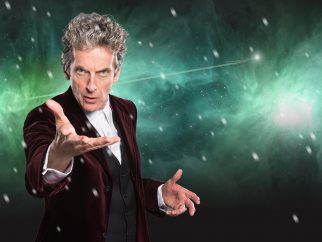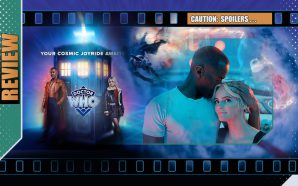Spoilers…
Humanity worships the monks – and has done throughout the centuries. They are our benevolent masters – and always have been.
At least, that’s what most people believe. A handful still seem to remember that the aliens have only been here six months and that the correct ‘history’ has been forgotten. Bill (Pearl Mackie) struggles to hold on to her real memories and the guilty knowledge that this is largely down to her own fateful decision to save the Doctor.
But the Doctor himself hasn’t been seen for six months – except in a series of broadcasts where he appears to praise the invaders and reconfirms their ‘cover story’. Bill is reunited with Nardole and together they head to an isolated location where it appears the Time Lord is being held. But is he there of his own free will and just how far will Bill go when she feels she’s been betrayed? And even beyond that… could the long-guarded Vault hold its own answer to how Bill may pay a penance?
Much has been made of this episode ahead of broadcast, not least the clip from the season trailer that seemed to suggest Capaldi’s Doctor might prematurely regenerate ahead of the due Christmas handover. Speculation suggested the Doctor would suffer a slow-burn regeneration as a result of being hurt in this episode and stretching out his ‘last’ days. But….
The ‘regeneration’ scene, as teased in the trailer, is probably going to frustrate an awful lot of people with the kind of bait and switch fakery that feels deeply manipulative rather than a sleight of hand. It used to be that regeneration energy was only used in dire circumstances as part of the narrative, but in recent years it’s being used as special-effects icing for a few too many scenes, hoping to increase the tension but diluting the impact when it’s needed for a genuine change in personnel. Here it’s nothing more than a light-show and one that makes very little sense given that Bill really has no idea about the specifics of regeneration. It’s a chain-yank stunt and your mileage will vary on whether that’s fair.
Indeed, there’s something ‘off’ about Capaldi’s performance this week. He usually makes the Doctor effortlessly interesting and earnest, but with The Lie of the Land everything is exaggerated a little too much. Yes, some of the story needs the Doctor to be ‘pretending’ but the smile is a bit too wide and maniacal, the banter just a little too on-the-nose and scripted even beyond the ‘reveal’. If this had all been a simulation a la Extremis, that might have been a clue, but instead it just feels… forced. That being said, it’s quickly become clear why Pearl Mackie was cast. Any danger that she was just a cookie-cutter blend of Rose and Martha has been dispelled with the actress making Bill one of the more interesting characters each week, this episode’s no exception. Should she be a ‘one season’ companion, she’s likely had the best run of a supporting player in some time. (Once again, love saves the day and the plot-point about Bill having lost her mother at an early age plays out as a key). Matt Lucas’ Nardole has also grown on me, though this probably isn’t his strongest week, he’s essentially exposition-man.
The ‘Monks Trilogy’ doesn’t really feel like a three-part story, each somewhat ignoring key elements of the previous chapter but simply continuing with the same antagonists. The sixth month jump here allows the production to conveniently ignore some of the connective tissue but while that may have worked better in episodes such as Turn Left (in which history is genuinely rewritten and we see the consequences for Catherine Tate and a dystopian England), all that happens here is a gaping chasm to be filled with a shrug. The Monks haven’t changed reality, they’ve merely made people forget the correct history, so the mechanics and particulars of what our characters have been doing is – or should be – important to know. How exactly did the Doctor get captured? Why are the Monks feeling any need to use him when killing him would be safer? Where’s the Tardis? Hey, a footnote, wouldn’t the Doctor try to help Erica (Rachel Denning) at the end of the last episode or is she now an afterthought? There’s just too much *missing* between the end of last week’s story and the start of this to be wholly invested in the dystopia we’re plunged into… and ultimately by half an episode that’s essentially a trick/test.
Add to this the fact that, by story’s end, mankind has conveniently forgotten almost everything that’s happened… and, again, it feels like a familiar trope that Who indulges a little too often to avoid real consequences nowadays. Yes, the episode underlines that very point – pliable humanity retrofitting whatever it’s easiest to live with can be endearing – but it does feel like an eternal get-out to avoid good epilogues and to keep contradictory stories self-contained or having to address some of the consequences for people. (Does that unfortunate we saw being dragged off in the pre-credit sequence merely forget she’s serving hard-labour)? Bill also looks pretty healthy bearing in mind she’s just undergone a suicidal brain-sucking strategy – another ‘This will KILL YOU!!!!!’ trope that fails to even bruise.
The Missy scenes, presumed to be a lynchpin of the season also feel disconnected here. The ‘vault’ aspect gives us a bottle-show location that has so little to do with the actual story momentum that Michelle Gomez’s efforts could have been filmed months later and elsewhere. Yes, in the worst kept secret ever, it’s Missy behind the door providing the needed maguffin to reverse the invasion… but a few lines of snark, some exposition and a few very sudden (crocodile?) tears at episode’s end feel like select additions to the running time. The sudden remorse though well acted is an unconvincing 180 degree switch from her ‘kill the girl’ speech a few minutes earlier. If this is a taster for what’s to come, it almost feels like an afterthought – Gomez stepping in to cameo and give deductions the Doctor could and SHOULD have come to in a normal script – and given his recent conveniently awesome problem-solving abilities.
The Lie of the Land isn’t bad – and it’s scarily topical when it nods towards the way regime-change works – but it feels very much like a great idea rendered in very broad-strokes, an episode using several concepts we’ve seen used better before and more built around a few key scenes that don’t carry the intended weight. As we head into the final quarter of the season, it’s an adequate entry and – as always – there’s some great ‘moments’, but is likely to evoke some annoyance rather than the gasps we were promised…

- Story7
- Acting7
- SFX6
- Dialogue8












